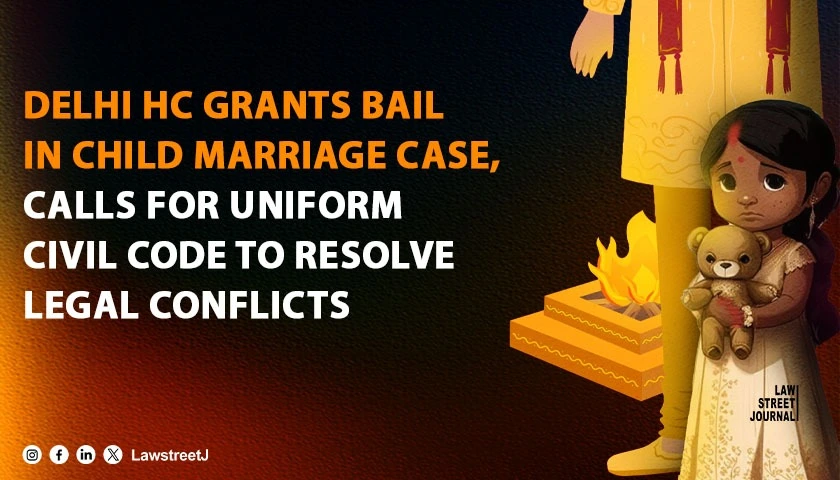New Delhi: The Delhi High Court has granted bail to a 24-year-old man accused of marrying a minor under the POCSO Act, while highlighting the stark conflict between Islamic personal law and Indian criminal law on child marriages, and calling for legislative clarity through a Uniform Civil Code (UCC).
Justice Arun Monga delivered the judgment, examining the intersection of religious freedom, personal laws, and criminal legislation, while emphasizing the need for Parliament to address these conflicts that criminalize entire communities for following their traditional practices.
The court addressed Bail Application No. 2867/2025 filed by Hamid Raza, who was charged under Sections 363 and 376 of the IPC and Section 6 of the POCSO Act for allegedly marrying a minor. The case involved complex factual circumstances, where the prosecutrix herself supported her husband’s bail application.
The court noted the disturbing backdrop of the case, observing:
“Barely 14 years child herself, when the mother in her was born as the prosecutrix bore her first child, forced by the heinous sexual assault of her stepfather, her supposed protector turned predator.”
The prosecutrix had found refuge when the applicant accepted her as his bride, with both getting married on June 4, 2024, under Islamic law. The couple also had a child from their wedlock. Justice Monga noted:
“Shattered, she found solace and dignity when the applicant herein accepted her as his lawful bride.”
The case became more complex when it emerged that the FIR was lodged by the prosecutrix’s stepfather, who was himself facing charges for sexually assaulting her. The court observed:
“The FIR was lodged by Mohan Bhagat (stepfather of the prosecutrix). Given the peculiar circumstances of the case, it seems that he had his own axe to grind in lodging the FIR by twisting/distorting facts.”
The court also consulted Islamic law experts, including Professor Faizan Mustafa, Vice Chancellor of Chanakya National Law University, who explained that Islamic law permits marriage upon attaining puberty, which is presumed at 15 years for girls, with specific exemptions under Section 2 of the Indian Majority Act, 1875.
The court noted the prosecutrix’s disputed age, with various documents showing different dates of birth, and observed:
“The victim’s age is a disputed fact and can only be conclusively determined upon full-fledged trial, as rightly contended by learned counsel for the applicant.”
Significantly, the prosecutrix herself supported the bail application and expressed her desire to live with her husband. The court noted:
“The prosecutrix herself has filed an affidavit stating that she has no objection to the grant of bail in favour of the applicant.”
The court found serious procedural violations in the arrest, noting that the applicant was not produced before a magistrate within the mandatory 24-hour period and was not informed of the grounds of arrest. Justice Monga stated:
“Such delay is not only illegal and arbitrary but also renders the detention of the applicant unlawful.”
The court also criticized the prolonged trial delays, observing:
“The charge-sheet was filed on 12.11.2024, and though charges have been framed, not a single witness has been examined till date.”
In the most significant part of the judgment, Justice Monga highlighted the fundamental conflict between personal and criminal laws, stating:
“Under Islamic law, a minor girl attaining puberty may lawfully marry, but under Indian criminal law such a marriage renders the husband an offender under the BNS and/or POCSO or both.”
The court posed critical questions about criminalization of religious practices, asking:
“Should society be criminalized for adhering to long-standing personal laws? Is it not the time to move towards a Uniform Civil Code (UCC), ensuring a single framework where personal or customary law does not override national legislation?”
Justice Monga emphasized the need for legislative intervention, stating:
“This conflict warrants legislative clarity. The Legislature must decide whether to continue criminalizing entire communities or to promote peace and harmony through legal certainty.”
The court acknowledged the complexity of implementing UCC while respecting religious freedom, noting:
“Opponents of UCC caution that uniformity risks eroding religious freedom guaranteed to every citizen as a fundamental right in the Constitution of India. However, such freedom cannot extend to practices that expose individuals to criminal liability.”
The judgment suggested a pragmatic middle path, stating:
“A pragmatic middle path could be to standardize core protections, such as prohibiting child marriages across the board with penal consequences, as they directly conflict with both BNS and POCSO.”
While granting bail, Justice Monga refrained from making conclusive observations on the marriage’s validity, stating:
“I have consciously refrained from expressing any conclusive opinion on the legality of the marriage in question.”
The court concluded with a call for parliamentary action, observing:
“The decision is best left to the wisdom of the lawmakers of the country. But a lasting solution must soon come from the Legislature/Parliament.”
Case Title: Hamid Raza vs. State of NCT of Delhi
Disclaimer: This content is produced and published by LawStreet Journal Media for informational purposes only and does not constitute legal advice. The views expressed are independent of any legal practice of the individuals involved.







![Delhi High Court Sets Aside Arbitral Tribunal's Award Against NHAI in Highway Project Delay Case [Read Judgment]](/secure/uploads/2023/07/lj_9605_23374c2e-392c-4491-a2fe-f2f12fc5272f.jpg)
![Delhi Court Rejects Stay Request in Defamation Case Against Rajasthan CM Ashok Gehlot [Read Order]](/secure/uploads/2023/08/lj_5208_80de1ddc-d76a-4f7f-b180-408e3ae14fb4.jpg)





